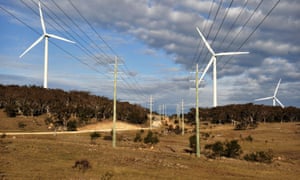Jobs could be created in three years with a focus on 12 areas
including large-scale renewable energy and electric vehicle networks
Nearly 80,000 jobs could be quickly created through a stimulus plan that aims to rebuild the Australian economy from recession while tackling the climate crisis, an analysis commissioned by the Climate Council says.
The report by the consultants AlphaBeta says 76,000 positions could be created over three years through nearly $22bn of combined public and private investment. It focuses on 12 areas including creating large-scale renewable energy projects, restoring degraded ecosystems, better dealing with organic waste, retrofitting inefficient public buildings and expanding electric vehicle networks.
It found 70% of the jobs would be in construction and administrative support roles, 42% would be based in regional areas and nearly a third would require little training.
The AlphaBeta work joins research commissioned by other advocacy and non-profit organisations that have proposed stimulus programs that would also cut greenhouse gas emissions rather than reinforce fossil fuel industries.The report by the consultants AlphaBeta says 76,000 positions could be created over three years through nearly $22bn of combined public and private investment. It focuses on 12 areas including creating large-scale renewable energy projects, restoring degraded ecosystems, better dealing with organic waste, retrofitting inefficient public buildings and expanding electric vehicle networks.
It found 70% of the jobs would be in construction and administrative support roles, 42% would be based in regional areas and nearly a third would require little training.
Andrew Charlton, a director with the consultancy and a former economics adviser to then prime minister Kevin Rudd, said the research highlighted stimulus projects that prioritised economic recovery, but would also leverage private investment and accelerate the shift to clean energy, a move that would reduce costs in the long-term. “If you can spend the money in that way you’re doing the taxpayer a big favour,” he said.
The analysis suggested investment in pilot-scale green hydrogen developments would be of the most benefit to the economy, yielding $4 of private spending for every public dollar invested. Large solar and windfarms would unlock $3 for every dollar spent, while electric vehicle infrastructure, improving waste collection and smaller, community-scale energy and storage projects could create $2.
AlphaBeta said the jobs plan could be tailored to meet the different needs of states and territories. In New South Wales, the best opportunities were in building public transport infrastructure and big renewable energy plants; in Victoria, it was utility scale clean energy and organic waste management. Ecosystem restoration was identified as a leading job creator in all other states and territories, often alongside clean energy.
The result would be a cleaner Australian economy, which is currently 43% more emissions-intensive than the OECD average. The country emits more per unit of GDP than each of the European Union, Japan, the US and Canada.
Significant figures from across the community, including business leaders, unions and the welfare sector, have pushed for a green recovery from recession. Several groups have suggested work-intensive programs to improve the energy efficiency of Australia’s substandard housing and building stock. A report by Beyond Zero Emissions, an energy and climate change thinktank, found practical projects to decarbonise the economy could on average create 355,000 jobs a year for five years.
The Morrison government has not yet made low-emissions investments a priority in its response. The energy and emissions reduction minister, Angus Taylor, called for a gas-fired recovery, and the National Covid-19 Coordinating Commission has strongly backed expanding the gas industry while giving little consideration to renewable energy, but the idea of a green recovery has won more support from some state governments.
Charlton said the AlphaBeta work differed from Beyond Zero Emissions’ report by focusing solely on what could be delivered immediately. “Our real lens here is an economic lens. How do we use the imperative to rescue the economy to support some of the long-term challenges? It’s saving the planet by saving the economy,” he said.
Amanda McKenzie, the Climate Council’s chief executive, said the AlphaBeta plan would put the country “on a practical, jobs-rich path and focuses on areas most in need”. “It sets us up for the future by creating jobs and tackling climate change,” she said. “It’s a win-win solution.”

No comments:
Post a Comment